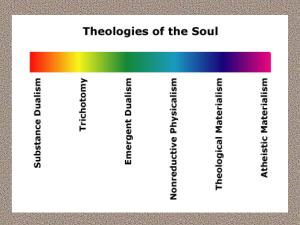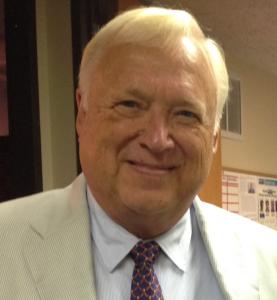No Soul? What do materialists say?

No Soul? What do materialists say? They say, “When yer dead, yer dead.” Well, sorta.
The no-soul model of the afterlife is one we discussed in a previous series, Afterlife 2: Naturalism: When yer dead yer dead. We called it naturalism. Here we call it materialism or atheism. Watch for additional names such as physical monism, reductive physicalism, or scientism. All these are the same thing. Right? Well, sorta.
Actually, there are different forms of materialism. So let’s use the term, materialisms, in the plural. What the various materialisms share in common is a denial of an everlasting soul, the denial of substance dualism. The three main forms of materialism we will look at here are Western atheism, Buddhism, and Christian theological materialism.
Materialist Theologies of the Soul
Here’s the spectrum of soul models we’ve been looking at. Locate the materialist options near the right side. Might there be such a thing as a “theological materialism”? Let’s see.

Atheistic Materialism
If we place substance dualism at one extreme end of a soul-talk spectrum, at the other extreme we place materialism. We’ll look briefly at two types of materialism, atheistic and religious.
Atheistic materialism dubs soul talk nonsense. Materialists answer to a number of different names such as naturalists, humanists, reductionists. The only reality is physical reality, say the materialists. No such thing as a spiritual substance exists. What we experience every day as mind or spirit is but an epiphenomenon of our brain’s activity. Here’s evolutionary biologist Jerry Coyne at the University of Chicago.
“There is, of course, no empirical evidence for either a soul or its unique presence in humans. It’s a superflous religious add-on to a scientific theory”(Coyne 133).
What we experience as a unity of consciousness or even rational thinking is only a byproduct of physicality. Materialists are confident that with enough research we will eventually be able to demonstrate that biological processes in the human brain exhaustively explain what happens in the human self or psyche. What we think of as soul activity can be reduced to biological activity. And human biology comes to us from the long history of evolution, not from God. Nature replaces God. So goes the argument of atheistic materialists.[1]
Can a Buddhist be an atheist and a materialist?

If we are Buddhists, we might want to place ourselves in the camp with the atheistic materialists. Metaphysically, Buddhists deny that there is such a thing as a human self. What we experience as our individual soul is a delusion.
The religious task for a Buddhist is to face the ultimate reality. And the ultimate reality is that we have no soul, no self (annata). What appears to be the person we think we are is actually only a heap of physical processes, physical processes that are finally hollow and empty of an inner essence.
Facing realistically the emptiness of inner essence would be a religious achievement for a Buddhist. Once we’ve faced this reality, we become released from the nexus of physical interactions. Then, what we took to be our inner self dissolves into the totality of reality. We experience nirvana.
Curiously, however, within Buddhism we also find the doctrine of reincarnation. On the one hand, Buddhists inherited from early Brahman pre-Hindus the concept of rebirth. The individual soul becomes reincarnated after death. On the other hand, Buddhists deny that such a thing as a spiritual substance transfers itself from one incarnation to the next. What Buddhism ends up with is a shambolic combination of substance dualism and atheistic materialism.
Christian theological materialism? Really?
Another variant still within the materialist camp is Christian theological materialism. Christian materialists find themselves quite at home with modern science. They are at home with biological reductionism, and quite at home with denying the existence of a separate soul substance. Eventually, we will see that everything that goes on in our minds can be explained by brain activity.

There’s a spirituality to Christian materialism, if this term does not cause confusion. Do you know Saint Josemaría Escrivá, (1902-1975), founder of Opus Dei? Escriva held that all temporal realities have a sanctifying power and Christians can find God in the most ordinary material things. Escriva complained that the Christian tradition had over-spiritualized things so that we’ve falsely come to believe we should remain aloof from the contemptible things of this world. Not so. Rather, we should highly value the material.
“Authentic Christianity which professes the resurrection of all flesh, has always quite logically opposed ‘dis-incarnation,’ without fear of being judged materialistic. We can, therefore, rightfully speak of a Christian materialism, which is boldly opposed to those materialisms which are blind to the spirit.”

For Escriva, Christian theological materialism is primarily a form of spirituality or way of living. But, what are the metaphysical implications? One implication is this: the afterlife requires resurrection of the body.
Perhaps the most erudite thinker on this topic is Christian philosopher Nancey Murpher at Fuller Seminary. Her position is called nonreductive physicalism. For a brief yet precise Closer to Truth interview that rejects sustance dualism in favor of resurection of the dead, see “Does a soul have an afterlife?”
Although Christian theological materialists can give up on the idea of a separate soul substance, they don’t give up on resurrection. They strongly emphasize that both Bible and tradition–tradition in the form of the Apostles’ and Nicene creeds–explicitly and unambiguously teach resurrection of the body, not immortality of the soul. No such thing as immortality is possible, say the materialists, unless God takes whatever action is necessary to raise the dead. If and when God takes such action, it will consist of raising the body. And the continuity of our identity in eternity will include bodily identity.
We will say more about resurrection of the body—the soma pneumatikon or spiritualized body—in future posts.
ST 4134. No soul? What do materialists say? Soul 4.
Where have we been? Where are we going?
Patheos ST 4131 Soul 1 Theologies of the Soul
Patheos ST 4132 Soul 2 Substance Dualism
Patheos ST 4133 Soul 3 Trichotomy
Patheos ST 4134 Soul 4 Materialisms
Patheos ST 4135 Soul 5 Emergent Dualism
Patheos ST 4136 Soul 6 Non-Reductive Physicalism
Patheos ST 4137 Soul 7 Bodily Resurrection
Patheos ST 4138 The Soul of Benedict XVI
Patheos ST 4139 Blessed Mother Olga of Alaska knitted mittens
Patheos ST 4140 Supporting Husbands in Theology
▓

Ted Peters (Ph.D., University of Chicago) is a public theologian directing traffic at the intersection of science, religion, and ethics. Peters is an emeritus professor at the Graduate Theological Union, where he co-edits the journal, Theology and Science, on behalf of the Center for Theology and the Natural Sciences, in Berkeley, California, USA. He recently co-edited Astrobiology: Science, Ethics, and Public Policy (Scrivener 2021) as well as Astrotheology: Science and Theology Meet Extraterrestrial Intelligence (Cascade 2018). He also co-edited Religious Transhumanism and Its Critics (Lexington 2022) and The CRISPR Revolution in Science, Ethics, and Religion (Praeger 2023). Peters is author of Playing God: Genetic Determinism and Human Freedom (Routledge, 2nd ed, 2002) and The Stem Cell Debate (Fortress 2007). See his blogsite [https://www.patheos.com/blogs/publictheology/] and his website [TedsTimelyTake.com].
▓
Notes
[1] Many American atheists say that, despite their growing numbers in society, they often choose to hide their unbelief due to fear of social stigma, a recent study published by the University of Nebraska-Lincoln suggests.Works Cited
Coyne, Jerry, 2015. Faith vs. Fact. New York: Viking.














